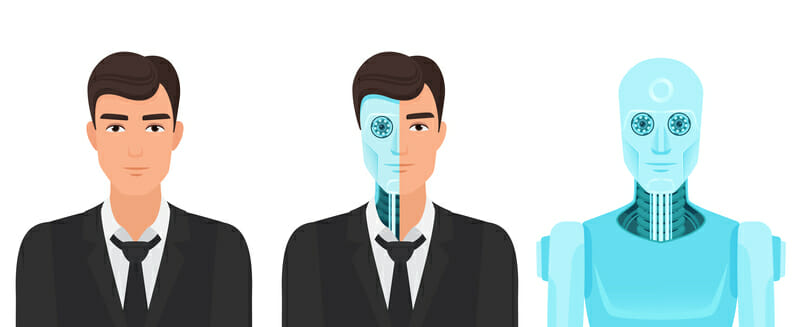It’s fair to say we’ve come a long way in terms of healthcare – and some could argue we’ve got a long way to go when it comes to finally beating the likes of cancer, Alzheimer’s and motor neurone disease – but there are a lot of developments on the horizon we can look forward to.
For instance, does anyone else remember that pod in Elysium where a woman gets in, it scans her, does its thing and then all you hear is something like: “Cancer completely removed”. Now THAT would be awesome!
Let’s have a look at what medical technology we can see in our future (some of which I may be evidently more excited about than others).
Real-life cyborgs
Okay, there’s something you really ought to know about me (and it’s kinda off topic, but bear with me), and it is this:
My end goal in life is not to live long enough to have children and see those children have children. It’s not to live long enough to meet aliens or see world peace. It’s not even to live long enough to see my artwork get international acclaim.
It’s to live long enough to acquire a robot body, goddamnit (although, I admit, it will require us humans having the tenacity to make it through the next few years without completely destroying our future, which is questionable at the best of times).
Anyway, real-life cyborgs are a decent step towards that goal! I mean, lookit this! This is my dream right here. Human man turns into actual robot! How, pray tell, could I not waste my own Dreamstime credits acquiring this image?!

Okay, you could argue we already have RFID chips, implanted defibrillators and pacemakers. The first neuroprosthetics are already on the market! Cochlear implants and retinal implants are already something you can buy, and people who are paralysed can move their limbs again with the help of exoskeletons!
In the future, the possibilities will be far-reaching, and it’s very possible we’ll see more and more people choosing to become cyborgs purely for recreational use.
Imagine a chip in your brain that gives you infinite memory storage backed up to the cloud, flawless language translation, or access to whatever information you need on demand – like a smartphone but in your head (that’d actually be quite scary, think of the security hazards, this is suddenly getting a bit Black Mirror. Sorry).
3D printed organs

This is already becoming a thing, too. In February 2022, a woman in Texas received a right outer-ear implant, which was 3D printed using cartilage cells harvested from her other ear! Those cells were multiplied into billions of copies, before 3DBio Therapeutics’ GMPrint bioprinter made them into a new ear.
Okay, so it’s the first time any kind of 3D-printed implant has been performed, but labs around the world are now successfully 3D printing skin, bones and mini organs. Imagine the reduction on waitlists this would have, and the amount of lives that would be saved!
Smart toilets that detect and monitor health issues
Only a couple of months ago, Withings – a smart home company – unveiled the U-Scan. Okay, so it’s not exactly a smart toilet, it’s a ’90-mm pebble-shaped urinalysis device’ that can turn ANY toilet into a ‘smart’ toilet – which is surely better!
When attached to your toilet bowl, it looks out for biomarkers in your urine, including ketone and the level of vitamin C detected. It can also track hormonal fluctuations by analysing levels of luteinizing hormone and pH.
It does need to be recharged every three months, but the benefits are already potentially amazing! Imagine never having to go for unnecessary urine samples at your GP again.
Fully autonomous surgical bots

Well, if they can drive buses, why not perform brain surgery, too – am I right?! Such a surgical robot is currently being developed by researchers at John Hopkins University – and yes, it will be fully capable of performing surgeries completely autonomously. Imagine that!
So, how will it work? Well, the robot, equipped with the likes of 3D vision and a machine-learning algorithm enabling it to effectively plan, adjust and make decisions during surgeries means that in theory, it should be able to do the job of a real doctor (is that discriminatory? I feel like I want to write a TV pilot called Dr Robot now, but I digress).
In fact, it’s already performed its first sugery! The robot is known as ‘Smart Tissue Autonomous Robot‘ and performed a laparoscopic procedure on porcine-tissue models – apparently involving successfully suturing the ends of a pig intestine. Delightful.
Being diagnosed through just your voice
Scientists have discovered characteristics of your voice – known as vocal biomarkers – can actually reveal a lot about your health! These biomarkers can play a crucial role in detecting things like diseases and other serious health risks.
One Israeli company, Beyond Verbal, has used its algorithms to help successfully detect the presence of coronary artery disease (CAD) in a patient test group. Boston-based company Sonde Health Inc. has also been developing a voice-based tool for diagnosing and monitoring an array of mental and physical health conditions.
There may be more breakthroughs yet to come.
A cancer-smelling knife

Surgical instruments that can detect cancers and other diseases – like the iKnife developed by researchers at Imperial College London – have actually been in use for a while now, but they’re getting better all the time (I’m sure these have been featured in at least one episode of Grey’s Anatomy).
And it still kind of takes your breath away when you see the words ‘cancer-smelling knife’. They can detect cancers and other diseases within a matter of seconds!
So, how does it work? Well, it delivers an electrical current to biopsy tissue, and the smoke emanating from the area (doesn’t that sound lovely?) is then chemically analysed. It’s pretty effective, too – with a recent success rate of 89% accuracy when diagnosing womb cancer. We like that a lot!
One last thing…
It may be exciting thinking about all these great medical tech, but without an NHS – one of the greatest medical achievements here in the UK, and admired throughout the world – it will all feel far less shiny. It’ll feel downright bleak, actually… not to be a Debbie Downer or anything.

